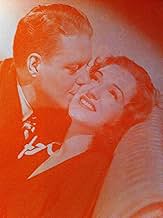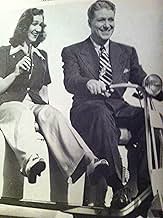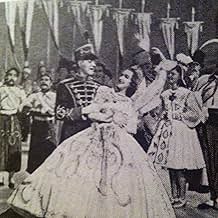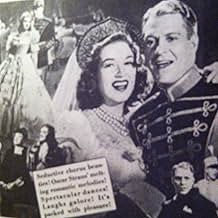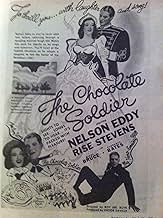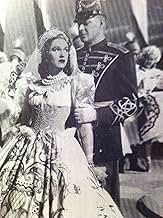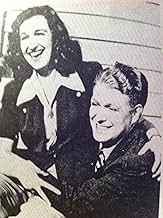Maria and Karl Lang are the singing duo of Vienna. Maria is very flirtatious and Karl very jealous. Karl decides to masquerade as a Russian guardsman and attempts to make Maria flirt with hi... Read allMaria and Karl Lang are the singing duo of Vienna. Maria is very flirtatious and Karl very jealous. Karl decides to masquerade as a Russian guardsman and attempts to make Maria flirt with him - to test her loyalty to him. As the Russian, Karl makes a vigorous attempt to seduce Ma... Read allMaria and Karl Lang are the singing duo of Vienna. Maria is very flirtatious and Karl very jealous. Karl decides to masquerade as a Russian guardsman and attempts to make Maria flirt with him - to test her loyalty to him. As the Russian, Karl makes a vigorous attempt to seduce Maria. For a moment she accepts then rejects him. Karl is left in turmoil.
- Nominated for 3 Oscars
- 3 wins & 3 nominations total
- Magda
- (as Dorothy Gilmore)
- Undetermined Secondary Role
- (uncredited)
- Singer - 'Seek the Spy' Sequence
- (uncredited)
- Emile, Voice Coach
- (uncredited)
- Waiter at the Double Eagle
- (uncredited)
- Messenger with Note
- (uncredited)
- Performer in Gypsy Café Sequence
- (uncredited)
- Stage Manager
- (uncredited)
- Flute Player
- (uncredited)
Featured reviews
The history of the original operetta is fairly well known: Straus wanted to adapt one of G.B. Shaw's earliest and arguably funniest plays, ARMS AND THE MAN to the operetta stage. Shaw was amenable but doubted the result would work and didn't want to undercut the ongoing royalty stream of one of his most successful plays (it is regularly performed to this day).
In compromise, Shaw demanded a number of conditions: 1) they WOULD use his basic plot (in fact the authors and Stanislaus Strange in his English language translation shoehorned most of Shaw's interpersonal comedy into the first and third acts of their operetta but omitted almost entirely the Fabian class comedy Shaw held dear to his heart), 2) they would not use any of the original character names or a single actual LINE of his dialogue, 3) all programs for productions in England had to carry the producers apologies to Shaw "for this unauthorized PARODY of one of his plays." 4) In return for these concessions, Shaw would decline ANY royalties for the operetta (but reserved the right to hate the result - which he did - probably at least in part as a result of the fortune he had declined on principle). Straus and company happily accepted the deal.
As Shaw expected, the operetta left out most of his best and funniest ideas; to his great surprise, it retained ENOUGH and had music GOOD enough that it was an enormous success anyway.
In 1940, when MGM wanted to continue their series of successful operetta films with Nelson Eddy, they found they had to approach the still very active Shaw - who had won an Oscar for Best Screenplay just two years before for his adaptation of his own play, PYGMALION. The great man was willing to be persuaded but unenthusiastic. He really didn't like the bowdlerization of one of his best perennial plays.
MGM had hoped/expected to snap up the rights to the old show on the cheap, but Shaw was not to be shortchanged. No deal could be struck on terms as cheap as MGM wanted. Still, MGM HAD the rights to the music and lyrics and the famous title so they went ahead anyway.
Technically they used Molnar's play THE GUARDSMAN as the basis for their film (it's really a generic but funny "jealous husband tests wife's fidelity with a masquerade she sees through" tale that's as old as the hills and Lubitch did it better in the 30's), but they didn't bother trying to adapt it to the old score.
Instead, they justified the TITLE and score they had bought by having the leads fairly obviously performing the operetta on stage between the off-stage comedy scenes (the credits in the opening "crawl" are among the most bizarre you will see anywhere). They just didn't show the plot scenes from the operetta and near the end rather outrageously had Eddy's character play the Second Act Finale from the operetta on the Act I set and in a brand new costume to make an offstage point - as if the audience in the theatre in the film wouldn't notice (watch the reactions of the delightful Nigel Bruce, tossed in as the befuddled best friend/observer).
MGM might as well have done DIE FLEDERMAUS for the same basic story and even better music, but what they got was and remains good fun - and Eddy wasn't ever up to a ...FLEDERMAUS in vocal or acting ability. Risë Stevens, a more down to earth actress than the bubbly MacDonald who usually left Eddy in the dust (and with a singing voice every bit as good), proved to be a solid, believable acting partner for him and (together with a relatively solid comedy book) makes Eddy seem to give one of his best performances on screen.
It's our loss that the declining popularity of Eddy and the quality of his vehicles deprived us of more pairings with Stevens who was so perfect for him. MacDonald was back for I MARRIED AN ANGEL (1942), he really didn't have a leading lady for the Claude Rains PHANTOM OF THE OPERA (1943) or KNICKERBOCKER HOLIDAY (1944) and then, except for NORTHWEST OUTPOST (1947), it was all but over.
Now that both are in the public domain, it would be wonderful to get actual movies of ARMS AND THE MAN (the original 1932 British film has not been seen in years) and the *real* CHOCOLATE SOLDIER (there was a 1915 silent film of the 1909 operetta co-directed by the American translator) with the Stanislaus Strange libretto out of Shaw, but until they are appear, this hybrid comedy with healthy glimpses of an over produced version of the original is good fun.
Did you know
- TriviaThis has interesting origins from musical and non-musical plays. In 1909, the operetta "The Chocolate Soldier" opened in New York. This was based on the non-musical play "Arms and the Man" by George Bernard Shaw. However, Shaw voiced objections to his play being adapted as an operetta. A silent film adaptation, The Chocolate Soldier (1914), based on the New York operetta, omitted any reference to George Bernard Shaw. In 1911, a Hungarian non-musical play "Testör" ("The Guardsman") by Ferenc Molnár, opened in Budapest. In 1941 when this film was made, George Bernard Shaw was still alive. Therefore, the music of the New York operetta and the plot of the Hungarian non-musical play "The Guardsman" were used.
- GoofsWhen Eddy is impersonating a Russian singer, the nightclub impresario introduces him as a bass, but then Eddy sings. He is a baritone.
- ConnectionsFeatured in We Must Have Music (1941)
- SoundtracksMy Hero
(1909) (uncredited)
Music by Oscar Straus
Musical adaptation by Bronislau Kaper and Herbert Stothart (1941)
Original lyrics by Rudolph Bernauer and Leopold Jacobson
English lyrics by Hugh Stanislaus Stange (as Stanislaus Stange)
Additional lyrics by Gus Kahn (1941)
Sung by Risë Stevens and Nelson Eddy in the show
Hummed a cappella by Florence Bates
Sung by Risë Stevens in the Gypsy Café
Reprised by Risë Stevens and Nelson Eddy in the show at the end
Details
- Runtime
- 1h 42m(102 min)
- Color
- Aspect ratio
- 1.37 : 1

